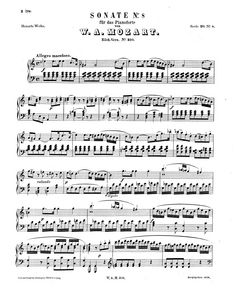

The Mozart Effect is a theory that listening to classical music, particularly music similar to Mozart's music, because it is sequential in nature, helps develop math skills in children. This dates back to a study (Rauscher, Shaw, and Ky 1993) that tested spatial-temporal reasoning in children and found that children would test higher after listening to Mozart. Their study also indicated that the effect was temporary.
However, they say that their research was then misinterpreted by others to mean that listening to classical music increased IQ scores.
Other studies have been done since the Rauscher study with mixed results. Some indicate no effect; others indicate that the music simply needs to be upbeat and enjoyable.
We asked our panel what they thought.
Collins said, "Studies have indicated that listening to some classical music such as the sequential form of a Mozart sonata helps mental development of very small children and is even used experimentally in therapy for attention-deficit disorder and autism. Some scientists have proven that playing classical music to plants helps them grow, because the plants have genes which help them "hear,' then stimulate the growth process. NPR aired a feature recently about scientists theorizing that migrating birds "hear' their way home by using Earth low frequency sound waves to guide them. I'm not sure I believe that listening to music makes one smarter or makes plants grow, even though children who study piano privately seem to score higher on certain IQ tests. However music which does not have the sequential patterns found in the form of Mozart or Beethoven can still have a calming and relaxing effect on many people."
Linderman said. "As I understand it, the Mozart Effect is based on a study which suggests that students perform better on spatial-reasoning tests after listening to Mozart. This has been popularized to mean that "listening to Mozart makes you smarter.' Other studies have dismissed that claim. It's an interesting idea. My wife and I have a newborn son, and I have enjoyed playing the piano for him with the Mozart Effect in mind. However, I don't put a lot of stock in it. I will say that I think that the thought process required to learn to play an instrument can help improve mathematical skills. I started taking piano lessons when I was in the third grade, and I continued through my senior year in college. I am convinced that those years of musical training helped me to become a better mathematician. It takes a lot of mental acuity to process a musical score and translate it into the fingers. That process is similar to understanding and interpreting the complexities of a mathematical problem. Music and mathematics are both active disciplines. I wouldn't expect my students to have a thorough understanding of mathematics just by watching me solve problems at the board. I know that they need to solve problems on their own in order to really learn mathematics. That's why I have my doubts about the Mozart Effect. I don't mean to suggest that listening to music is entirely passive, but it doesn't require the same amount of mental engagement necessary to learn to play the piano."
Smith said, "I believe the Mozart Effect refers to an enhancement of spatial-temporal reasoning, as this term is used by psychologists. I don't think the research establishing the effect itself is conclusive, so it's difficult to comment on the the importance of sequentiality. However, I would expect the brain to respond differently to sequential music as opposed to non-sequential. I'm no neuroscientist, and neuroscience can easily be (and often is) misinterpreted by nonscientists, but it seems that it would be relatively easy to observe differences in brain response to sequential vs. non-sequential music. The question of how these responses do or do not translate into changes in spatial-temporal reasoning is much more complex, and I don't think neuroscience is anywhere near being able to provide an answer. I do believe it eventually will. The answer may have to await the singularity, after which there will be an answer that we won't be able to understand.
"In the meantime we should be cautious about extrapolating the evidence to fit our own desires and preconceptions and remain skeptical of those who would sell us on theirs. There are a lot of half-baked ideas out there. Evaluate the science and separate it from the hype."
>> BACK to the main story.